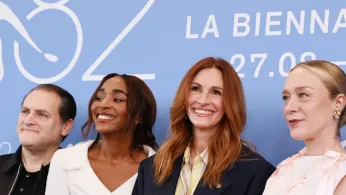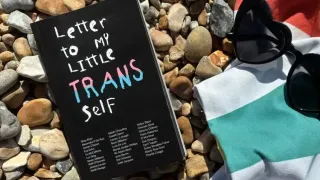
3 hours ago
Julia Roberts and Ayo Edebiri Discuss Queer Infatuation, Power, and Representation in ‘After the Hunt’
READ TIME: 4 MIN.
Hollywood’s latest academic thriller, ‘After the Hunt,’ directed by Luca Guadagnino and starring Julia Roberts and Ayo Edebiri, has already sparked critical and community interest for its unapologetic exploration of queer desire and power dynamics within an Ivy League setting. In a candid interview with Out Magazine, Roberts and Edebiri shared insights into how their characters navigate professional and erotic tensions, and how these themes contribute to the broader conversation about LGBTQ+ representation in media .
‘After the Hunt’ centers on Julia Roberts’s character, an Ivy League professor whose relationships—with her colleagues, spouse, and a student played by Ayo Edebiri—form the backbone of the film’s tension. The story is notable for its “sapphic twist,” as described by Out Magazine, positioning a queer female relationship at the heart of a mainstream thriller .
Edebiri, in her Out Magazine interview, reflected on the intricacies of queer infatuation in the narrative. She described how the “gay version of F, Marry, Kill” applied to her and Roberts’s characters, highlighting the way humor and desire intersect in LGBTQ+ storytelling . Edebiri’s remarks underscore the importance of portraying queer women’s relationships with nuance, avoiding stereotypes and instead exploring emotional depth and complexity.
The film’s psychological intensity is driven not only by romance but by the complex interplay of power—academic, social, and personal. Edebiri discussed how the story interrogates who holds influence in elite spaces and what it means to desire power, as well as to be desired in environments where the stakes are high .
During a press tour appearance, Edebiri emphasized the significance of being a young Black woman navigating Hollywood, crediting the generations of Black women who have paved the way for her to “be myself in the ways that I want to be” . This intersectional perspective—addressing both race and sexuality—is increasingly central to conversations about authentic representation in the entertainment industry.
Roberts, known for her nuanced performances, approached the role with an understanding of the cultural weight carried by stories about queer women. In various interviews, she has acknowledged the need for LGBTQ+ narratives to be told with honesty and emotional authenticity, steering away from sensationalism and focusing on lived experiences .
The film’s director, Luca Guadagnino, has a track record for exploring queer desires in his work, further lending credibility and depth to ‘After the Hunt’ . The collaboration between Guadagnino, Roberts, and Edebiri signals a commitment to telling stories that challenge the status quo, especially in an industry where LGBTQ+ women, particularly women of color, have often been relegated to the margins.
The cultural impact of ‘After the Hunt’ extends beyond the screen. Edebiri’s recent viral response to an Italian journalist’s questioning about #MeToo and Black Lives Matter at a press junket was celebrated online for its clarity and assertiveness, with many praising her for holding the conversation to a higher standard and refusing to let critical social issues be dismissed .
This moment resonated with LGBTQ+ audiences, who have long advocated for intersectional representation and the right to tell their own stories. The film’s press circuit has become a platform for discussing not only the narrative itself but also the broader cultural forces shaping how queer lives are portrayed in media.
The significance of ‘After the Hunt’ lies in its refusal to treat queer desire as an incidental subplot. Instead, the film foregrounds the emotional and erotic connections between women, challenging audiences to reckon with the realities of LGBTQ+ experience. Edebiri, who has spoken openly about her own journey—including leaving the church because of her gay and Muslim friends—brings a personal authenticity to her performance .
LGBTQ+ advocates have noted that such portrayals are vital for fostering empathy and understanding. By centering narratives about queer women, the film contributes to a growing movement towards inclusivity in entertainment—a movement that seeks to represent the full spectrum of LGBTQ+ identities without compromise.
As Hollywood faces ongoing calls for greater diversity, films like ‘After the Hunt’ set new benchmarks for inclusive storytelling. The collaboration between established stars such as Julia Roberts and emerging voices like Ayo Edebiri demonstrates the potential for intergenerational mentorship and the importance of amplifying marginalized perspectives.
LGBTQ+ news outlets and advocacy organizations have highlighted the film as a positive step towards dismantling the barriers that have historically limited queer women’s visibility on screen. Community members are watching closely to see whether the film’s success will inspire more studios to invest in stories that reflect the lived realities of LGBTQ+ people.
‘After the Hunt’ is more than a psychological thriller—it is a cultural milestone for queer representation, powerfully rendered by two actresses committed to authenticity and inclusivity. Through their thoughtful engagement with Out Magazine and other media, Roberts and Edebiri have helped elevate the conversation about what it means to see oneself reflected in art. For LGBTQ+ audiences and allies, the film stands as a testament to progress, resilience, and the transformative power of storytelling.






